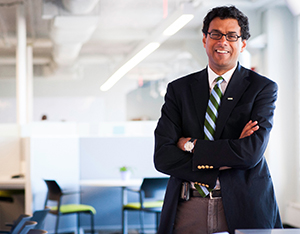- Keynote Address
- 9:15-10:45 a.m. Saturday
- BCEC Ballroom East
He has given inspirational commencement addresses at Stanford University, the University of Chicago, the California Institute of Technology and Williams College. He has been a staff writer for The New Yorker since 1998. And he has written three best-selling books, one of which was a finalist for the National Book Award. Atul Gawande, M.D., is such a powerful communicator and tireless advocate for health and science that it’s easy to forget that he still finds time to practice surgery at Brigham and Women’s Hospital in Boston.

Atul Gawande, M.D., will present ‘System Innovation in Surgical and Anesthesia Care’ during his Keynote Address Saturday.
Attendees at Dr. Gawande’s Keynote Address will learn how his experiences in the O.R. informed his communication and health policy acumen and earned him a place as one of the most sought-after lecturers in the world. In 2010, Time magazine named him one of the world’s 100 most influential thinkers. What’s as incredible as that honor from Time is that he has probably gotten even busier since then.
Dr. Gawande is currently Executive Director of Ariadne Labs, Professor in the Department of Health Policy and Management at the Harvard T.H. Chan School of Public Health and Samuel O. Thier Professor of Surgery at Harvard Medical School. He is founder and current chair of Lifebox, which launched in 2011.
His address will expand on the causes of adverse events and poor outcomes in surgical patients, the progress made in improving outcomes, and the remaining challenges and next directions for transformative results.
Dr. Gawande said he is looking forward to speaking to an audience of physician anesthesiologists — his colleagues and partners — which is something he doesn’t often get to do.
“Our work is rooted in everyday practice on surgical teams, navigating the challenges of the complexity of our science, technologies, patients and personnel,” he said. “My hope is to be able to articulate those challenges and how we find better and better ways of working.”
Although Dr. Gawande believes that medical practice and philosophy have not adequately kept pace with changes in health care over the last 100 years, he is optimistic about the future because the most important values in health care are as strong as ever.
“Medicine still has the core values right and continues to push to live up to them,” he said. “The most fundamental value? That all lives have equal worth.”
Return to Archive Index